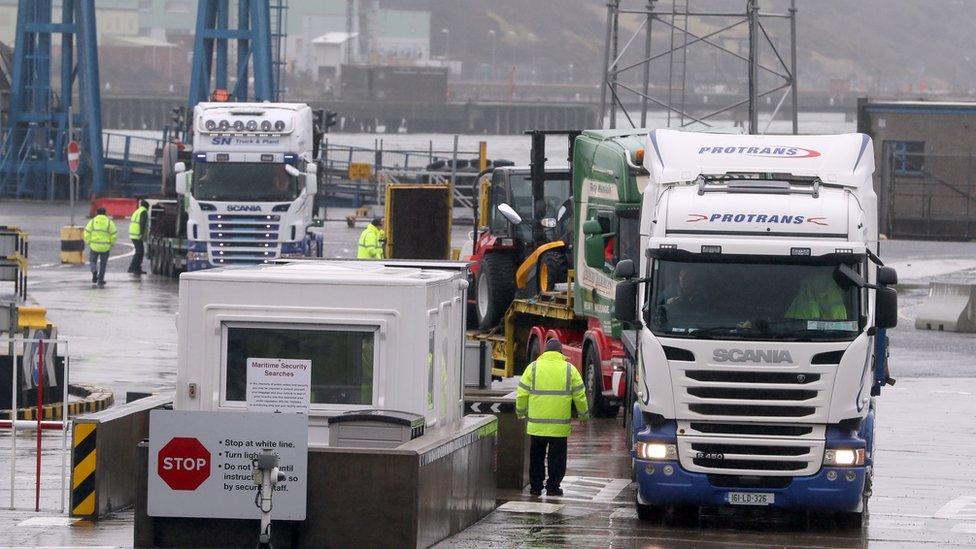Brexit: DUP says NI Protocol could cause political instability
- Published
- comments
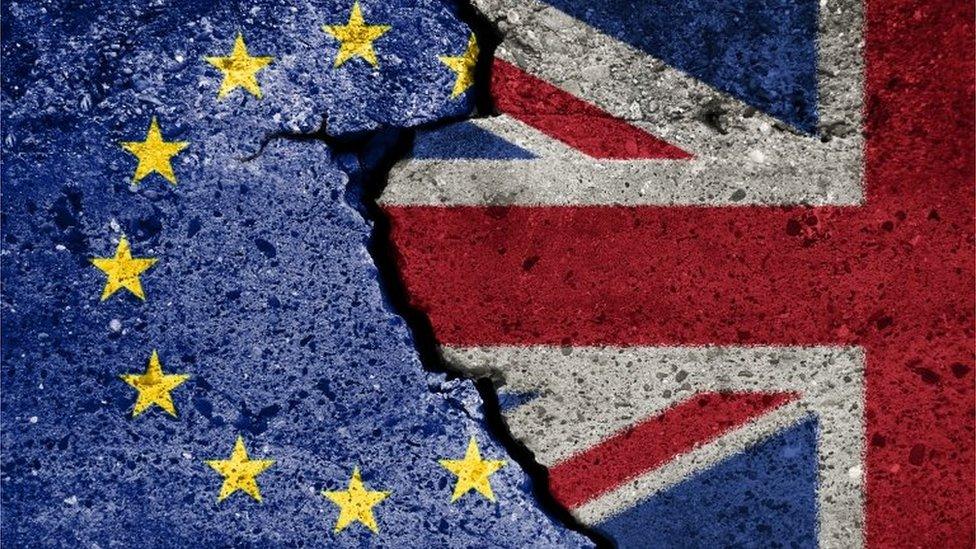
The NI Protocol has "the potential to cause political instability" and the British government must act to remove it, a senior DUP MP has said.
Sir Jeffrey Donaldson was speaking during a debate in Westminster triggered by a DUP e-petition.
The e-petition is part of the DUP's five-point plan to scrap the protocol.
But the government's NI Minister Robin Walker insisted the problems could be resolved by "sensible implementation" of the protocol.
As with all such petitions, it required 100,000 signatures to get a Parliamentary debate. It received more than 140,000.
Sir Jeffrey had cited problems with trade experienced by some of his constituents, and said it was the "responsibility of the government to act".
"In this centenary year, we expect the government to act and replace it with arrangements that respect NI's place in the UK."
But Mr Walker said he believed the issues raised by the DUP could be resolved by adopting a "pragmatic approach" with the EU.
The minister also repeated that the government would retain all options, including the potential to trigger Article 16 and override the protocol, if necessary.
Protocol is 'only solution'
SDLP Foyle MP Colum Eastwood said his party understood the concerns of those in the unionist community, but he said there was a responsibility to be "honest" that the protocol was required as a direct result of Brexit.
"We have to resolve issues through the protocol - the only alternative to the protocol is a border in Ireland and if people want that, they should say it."

What is the NI Protocol?
The Northern Ireland Protocol is part of the Brexit deal which prevents a hardening of the land border between Northern Ireland and the Republic of Ireland.
It does that by keeping Northern Ireland in the EU single market for goods.
That has created a new trade border with Northern Ireland and the rest of the UK.
Unionists oppose the protocol, arguing that it has damaged internal trade from GB to NI and poses a risk to the future of the UK union.
But anti-Brexit parties in NI say that it must be implemented in full, and that issues should be worked out through joint UK-EU processes.

Alliance MP Stephen Farry told the debate that the protocol had been the response to the "prior rejection of those who rejected better alternatives".
He said parties should be focused on working out ways to make the protocol's implementation smoother, citing his party's call for the UK to negotiate a comprehensive veterinary agreement, along the lines of the EU's agreement with Switzerland.
The chair of the NI Affairs Select Committee at Westminster, Simon Hoare, said the protocol had the potential to create a "golden age" for the NI economy, but the DUP rejected that suggestion.
A judicial review challenging the Northern Ireland Protocol was launched over the weekend by, among others, Traditional Unionist Party (TUV) leader Jim Allister, former MEP Ben Habib and Labour MP Kate Hoey.
It has now been joined by the DUP and the Ulster Unionist Party (UUP).
Mrs Foster said they were committed to challenging the Northern Ireland Protocol "in the courts, in Parliament, in Stormont and in Brussels".
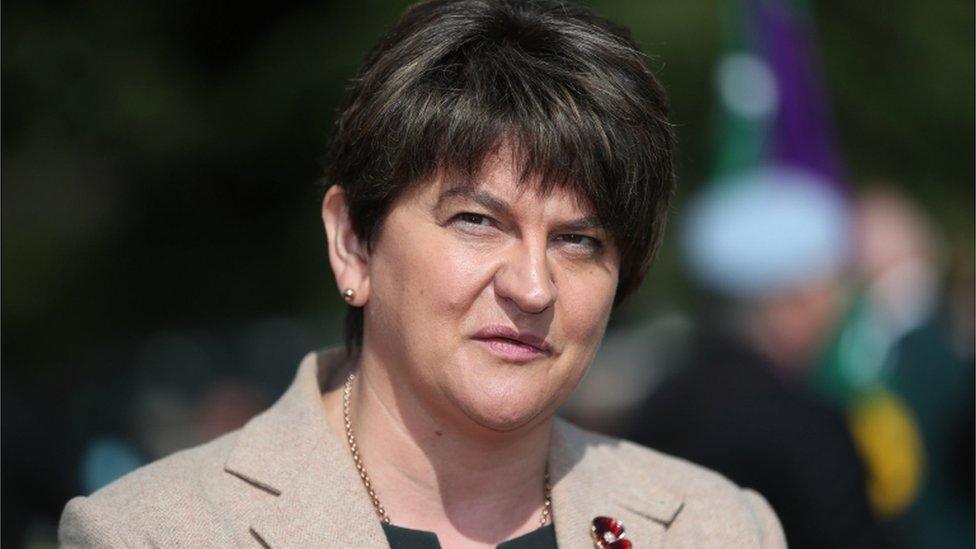
Arlene Foster believes the government must ditch the protocol
On Monday, she told the BBC's Good Morning Ulster programme she believed the action had a "good chance of success".
"It is part of our five-point-plan that we will work with other unionists to send that very clear message around the protocol," she said.
"We will use all of our mechanisms to do that, both political as we are in the House of Commons, with the petition being heard, and of course, the legal action."
Ulster Unionist leader Steve Aiken told the same programme that the protocol had undermined "princples of democracy" in Northern Ireland, and that he believed the joint action had a good chance of success.
While Mr Allister said removing the Northern Ireland protocol would require a "twin-tracked approach".
"This judicial review on its own will not be enough to unstitch the protocol which will surely take some time by its various processes," he told BBC Radio Foyle.
"It requires both determined political action and determined legal action, which is what this judicial review is all about."
Focus on 'providing certainty'
Northern Ireland's Deputy First Minister Michelle O'Neill said the legal attempt by unionists to challenge the Northern Ireland Protocol is "futile" and she compared it to "a dog chasing its tail round and round".
"The ironic thing is that we wouldn't have a protocol if we didn't have Brexit," she told UTV's View from Stormont programme on Monday night.
Earlier on Monday, she accused some political parties of "playing games" over the protocol.
She said problems with trade across the Irish Sea were a "direct result" of Brexit, not the protocol, and she was working to provide businesses with certainty.
The Sinn Féin minister also said she hoped she and Mrs Foster would take part in a meeting of the UK-EU joint committee on Wednesday to try and resolve some of the outstanding issues, such as requests to extend grace periods.
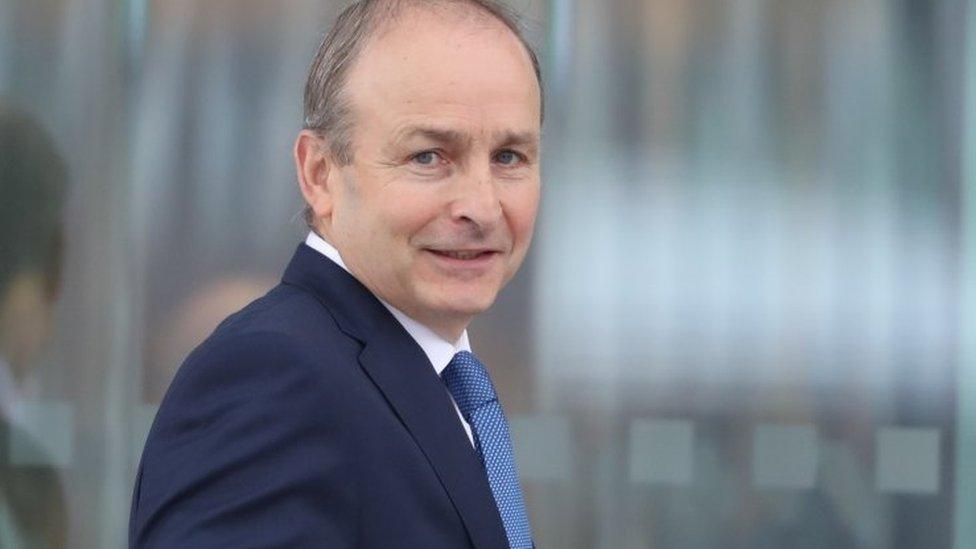
Micheál Martin said it was up to Dublin and London to ensure the protocol worked
Taoiseach (Irish Prime Minister) Micheál Martin has also reiterated his view that there are "many inherent benefits" in the Brexit protocol for Northern Ireland.
Speaking at the opening of the 60th session of the British-Irish Parliamentary Assembly which brings together UK politicians and those from the Dáil (Irish Parliament), Mr Martin said Dublin and London had to ensure the protocol worked.
"I warmly welcome the work between Brussels and London to move forward and find ways of easing implementation," he said.
"Critically, this is being done in a context where both sides have underlined their commitment to the Good Friday Agreement and protocol.
"It is right we all work closely to ensure the protocol works and disruption is minimised to the greatest extent."
- Published5 February 2021

- Published21 February 2021
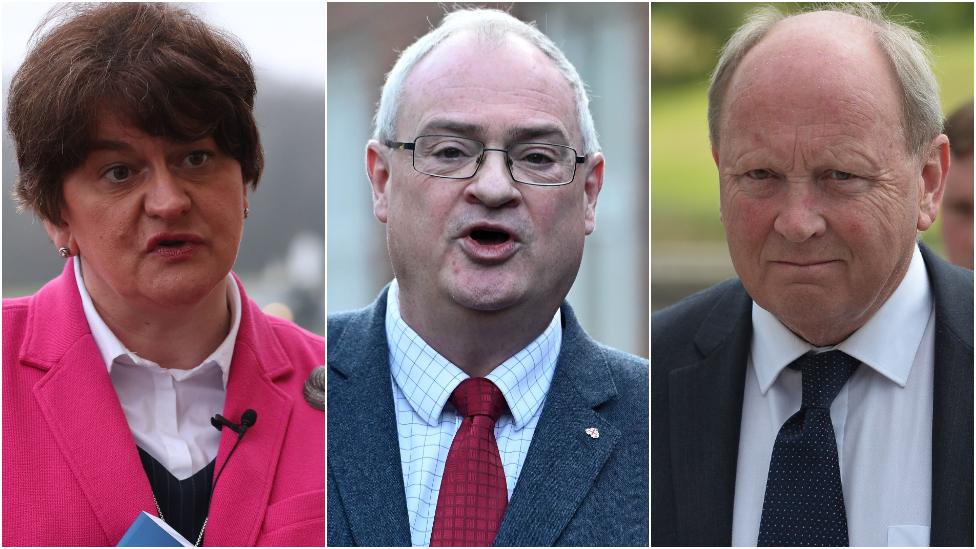
- Published2 February 2024

- Published16 February 2021
